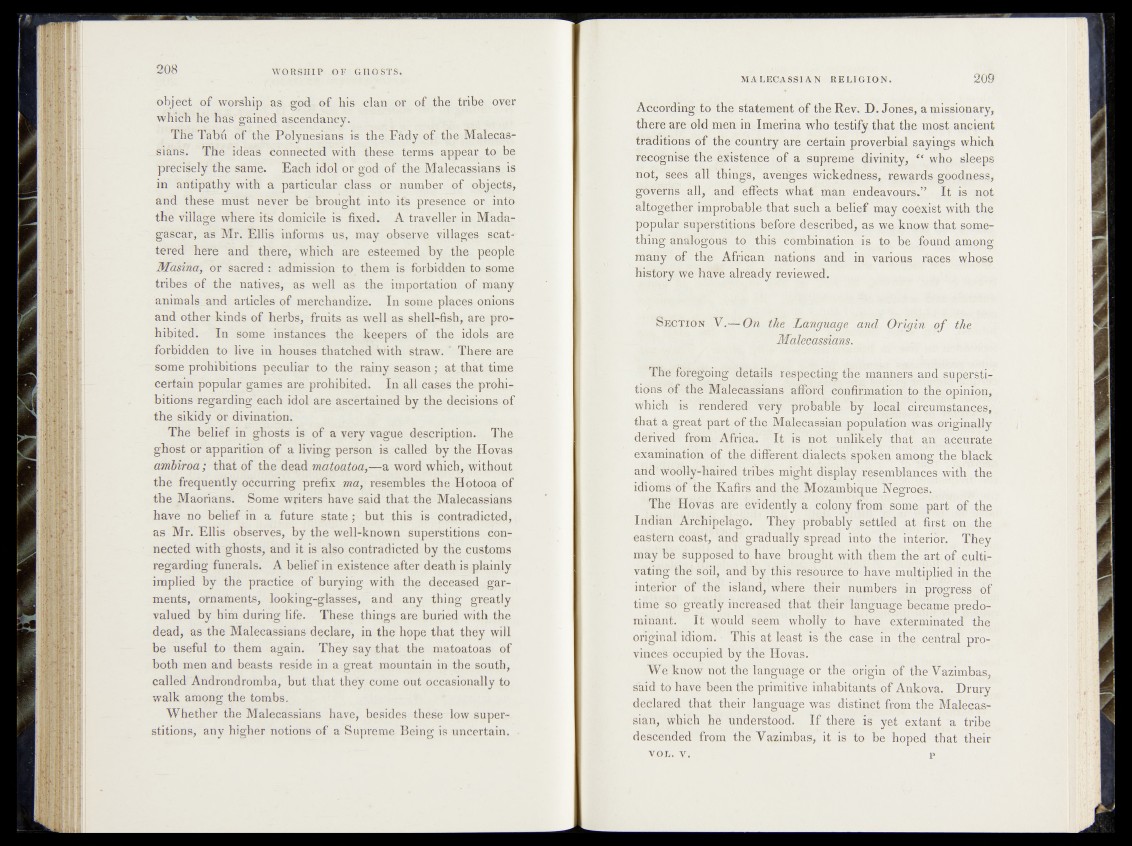
208 w o r s h ip o f g h o s t s .
object of worship as goch of his clan or of the tribe over
which he has’gained ascendancy.
The Tabu of the Polynesians is the Fâdy of the Malecas-
..sians. The‘ideas connected with these terms appear to be
precisely the same. Each idol or god of the Malecassians is
in antipathy with a particular class or number, of obj$cts,
and these must never be brought into its presence or in.tó
the village where its domicile is fixed. A traveller in Madagascar,
as Mr. Ellis informs us, may observe villages scat*
tered here and there, ' which are esteemed by the people
Masina, Or sacred admission to them is forbidden to. ^ome
tribes of the natives," as well as the importation of many
animals and articles of merchandize. In some places onions
and other kinds of herbs, fruits as well as shell-fish, are prohibited.
In some instances the keepers of the idols are
forbidden to live in houses thatched With straw. ' There are
some prohibitions peculiar to the . rainy season ; at.that time
certain popular games are. prohibited. In nil cases the prohibitions
regarding each idol are ascertained by the decisions-of
the sikidy or divination.
The belief in ghosts is of a very vague description. The
ghost or apparition of a living person is called by the Hovas
ambiroa; that of the dead matoatoa,—a word which, without
the frequently occurring prefix ma, resembles the Hotooa of
the Maorians. Some writers have said that the Malecassians
have no belief in a future state; but this is contradicted,
as Mr. Ellis observes, by the well-known superstitions connected
withrghosts, and it is also contradicted by the customs
regarding funerals. A belief in existence after death is plainly
implied by the practice of burying- with the deceased garments,
ornaments, looking-glasses, and any thing greatly
valued by him during life. These things are buried with the
dead, as the Malecassians declare, in the hope that they will
be useful to them again. They say that the matoatoas of
both men and beasts reside in a great mountain in the south,
called Androndromba, but that they come out occasionally to
walk among the tombs.
Whether the Malecassians have, besides these- low superstitions,
any higher notions of a Supreme Being is uncertain.
MA LECASS"1 AN RELIGION. 209
According to the statement of the Rev. D. Jonçs, a missionary,
there are old men in Imerina who testify that the most ancient
traditions of the country are certain proverbial sayings which
recognise the existencejpf a supreme divinity,,who s|eeps
n o v sees, all 'things," avenges wickedness,, rewards gppdn.ess,
governs all, and effects what man endeavours.” It is. pot
altogether improbable that spen a' bejaefmay ©oèxâst with the
popular superstitions^before described, as Wje^now that someth
nig analogous "to this ^Imbinatjon is t% pfe ^.fo un d, amon g
many of the African nations and in variops races whose
history-We havh already reviewed,
Section *V.-— On the Language arid Qriain o f the
Malecassians.
The foregoing details respecting the manners and superstition's
of the Malecassians afford" confirmation thjh p Opinion,
which rendered very probable by l o c a l ^
that a great part of the Malecassian population jwas^originally
derived from Africa! It is pot uipikely that an ^ukenrate
examination of the, different djalects{ spoken among the black
and wooHy-haired tribes might display resemblances with! the
idioms of the Kafirs and the Mozambique Negroes.
The Hovas are evidently a colony from some part of the
Indian Archipelago. They probably .settled at fust on .the
eastern coast, and gradually Spread into thF interior. Theyj
may be supposed to have brought with them the' art. of, cultivating
the soil, and by this resource to have multiplied in the
interior of the island, where their numbers in progress, of
time" so greatly increased that their language became predominant.
It lyohld' seem wholly to "have exterminated the.
original idiom. This at least is the case jn the central provinces
occupied by the Hovhs!" *
We know not the language or the'origin of the Vazimbas,
skid to have been the primitive inhabitants of1 Antova. Drury
declared that their language was distinct from the Majecas-
sian, which he understood. If there is yet extant a tribe
descended from the Vazimbas, it is to be hoped that their
voe. v. p